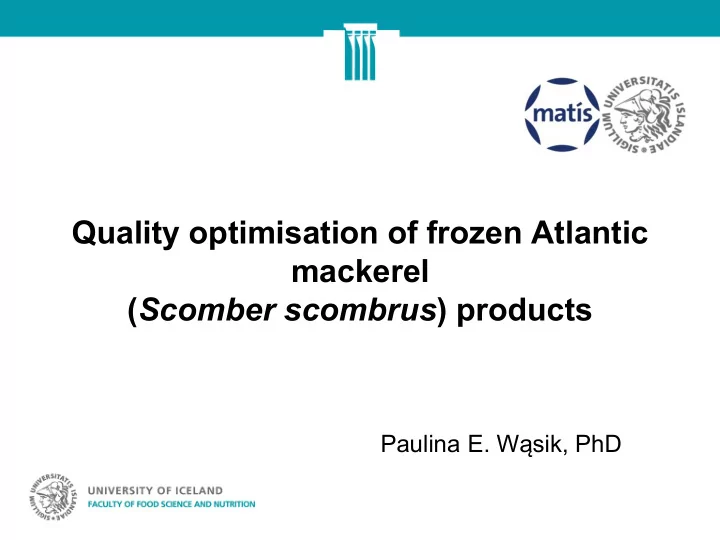

Quality optimisation of frozen Atlantic mackerel ( Scomber scombrus ) products Paulina E. W ą sik, PhD
Introduction Atlantic mackerel (Scomber scombrus) is known from widespread relocations and has been discovered in Icelandic waters since 2007 and gained great economical importance The mackerel migrates into Icelandic waters during the summer period (June – September), in order to find larger and richer feeding areas after spawning and travelling
Economic importance of Atlantic mackerel 29% Statistics Iceland. The relative value of seafood exports in 2012
Product evolution
Temperature profiles from catching to the consumer 6. Transportation / Storage
Factors affecting quality of frozen mackerel products Frozen storage conditions Catching time variation Paper II - V Paper I - IV Processing technologies Paper IV Geographical variation Heat treatment Paper I Paper V
Paper I Effect of seasonal variation on lipid composition August September
Paper II Effect of frozen storage temp. on lipid oxidation 0.6 1.4 (µmol MDA/g muscle) Lipid hydroperoxide (µmol/g muscle) 1.2 0.5 Sept. TBARS 1.0 0.4 0.8 0.3 Aug. 0.6 0.2 0.4 0.1 0.2 0.0 0.0 0 3 6 9 12 0 3 6 9 12 Storage time (months) Storage time (months)
Paper III The effect of temperature abuse on quality attributes temperature abuse temperature abuse temperature abuse temperature abuse (-12 ° C for 1 month) (-12 ° C for 1 month) (-12 ° C for 1 month) (-12 ° C for 1 month) (Stable temp.) (Temp. abuse) 4 Peritoneum deterioration (Grade) 3 Gaping (Grade) 3 2 2 1 1 0 0 0 1 3 6 9 0 1 3 6 9 Storage time (months) Storage time (months)
Paper III The effect of temperature abuse on lipid stability (Stable temp.) (Temp. abuse) 1.4 3.5 Free fatty acids (g/100 g lipids) 3.0 1.2 TBARS (µmol MDA/g) 2.5 1.0 2.0 0.8 0.6 1.5 1.0 0.4 0.5 0.2 0.0 0.0 0 1 3 6 9 0 1 3 6 9 Storage time (months) Storage time (months)
Paper IV Mechanical deformation of frozen Atlantic mackerel products Deterioration due to Deterioration due to Deterioration due to Deterioration due to enzymatic activity enzymatic activity mechanical deformation mechanical deformation Headed/gutted; plate frozen Whole; plate frozen
Paper IV Effect of frozen storage duration on lipid oxidation Whole mackerel Headed/gutted mackerel
Paper IV Effect of frozen storage temperature on fish yellowness - 25 ° C - 18 ° C
Paper IV Effect of frozen storage duration on lipid oxidation - 25 ° C - 18 ° C
Conclusions Fish from early summer ( August ) had a higher nutritional value , since its polyunsaturated fatty acids level was greater than for fish caught in late summer ( September ) Temperature abuse is responsible for physicochemical quality loss, as well as loss of food safety (oxidative and hydrolytic rancidity). Therefore it is necessary to keep temperature constant during transportation, processing and storage It can be recommended to store frozen products of Atlantic mackerel at -25 ° C rather than at -18 ° C in order to maintain its quality during long term The present study indicated a higher sensitivity of whole storage mackerel toward enzymatic deterioration in comparison to headed and gutted products. On the other hand, headed and gutted fishes showed high mechanical deformation as affected by processing techniques as well as lipid oxidation development.
THANK YOU
Recommend
More recommend